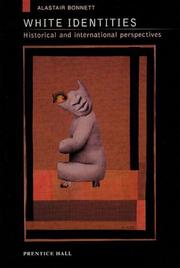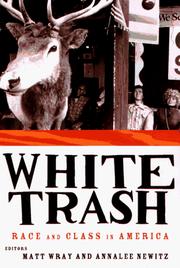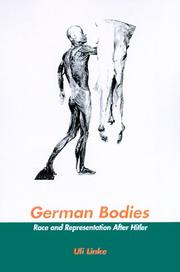| Listing 1 - 10 of 10 |
Sort by
|

ISBN: 058235627X Year: 2000 Publisher: Harlow, England New York Prentice Hall
Abstract | Keywords | Export | Availability | Bookmark
 Loading...
Loading...Choose an application
- Reference Manager
- EndNote
- RefWorks (Direct export to RefWorks)
Geografie --- Sociale geografie --- Maatschappij. --- Whites --- Race identity --- Whites - Race identity. --- Race identity.

ISBN: 0415916925 9780415916929 Year: 1997 Publisher: London: Routledge,
Abstract | Keywords | Export | Availability | Bookmark
 Loading...
Loading...Choose an application
- Reference Manager
- EndNote
- RefWorks (Direct export to RefWorks)
Whites --- Social classes --- Social conditions. --- Race identity --- United States --- Social conditions --- 1980 --- -Whites --- Whites - United States - Social conditions. --- Whites - Race identity - United States. --- Social classes - United States.
Book
ISBN: 9782707175588 2707175587 Year: 2013 Publisher: Paris: La Découverte,
Abstract | Keywords | Export | Availability | Bookmark
 Loading...
Loading...Choose an application
- Reference Manager
- EndNote
- RefWorks (Direct export to RefWorks)
« Blancs », « petits Blancs », « racisme anti-Blancs »... Ces expressions empruntées au lexique historique de l'extrême droite ont refait une brutale apparition dans le débat public français depuis les années 2000. Alors que la France ne cesse de réaffirmer son credo républicain selon lequel il ne peut exister aucune distinction raciale, allant jusqu'à bannir le mot « race » de la législation, comment comprendre ce surgissement de la « question blanche » dans la rhétorique politique et médiatique ? Au PS, Manuel Valls voulut naguère mettre à l'image « quelques Blancs, quelques white, quelques blancos... » dans sa belle ville d'Évry ; au nom de l'UMP, Jean-François Copé est lui parti en guerre contre le « racisme anti-Blancs », tandis que l'éditeur et polémiste Richard Millet ne craint pas d'affirmer que passer par la station Châtelet-Les Halles à 6 heures du soir est un « cauchemar absolu [...] surtout quand je suis le seul Blanc ». Le débat sur les « minorités visibles », prégnant depuis une vingtaine d'années, s'est ainsi déplacé vers un questionnement sur la « majorité invisible ». Mais qu'est-ce qu'être blanc ? Une couleur ? Ce serait si simple... Pour la première fois en France, ce livre cherche à décliner les nuances de ce terme controversé afin d'en interroger la pertinence et les usages. Écrit par des contributeurs d'horizons, d'opinions et d'origines divers, il se veut à la fois une exploration du discours sociopolitique contemporain, une analyse historique de sa genèse coloniale et de ses héritages, mais également une réflexion sur la façon dont ce « blanc » colore nos imaginaires culturels, du cinéma à la littérature, du rap à la télévision.
Racisme --- Histoire --- Aspect politique --- Whites --- Racism --- Race relations --- Race awareness --- Race identity --- Whites - Race identity - France --- Racism - France --- Race relations - France --- Race awareness - France
Book
ISBN: 9782354801298 2354801297 Year: 2013 Publisher: Paris: Amsterdam,
Abstract | Keywords | Export | Availability | Bookmark
 Loading...
Loading...Choose an application
- Reference Manager
- EndNote
- RefWorks (Direct export to RefWorks)
"Diversité", "lutte contre les discriminations", "statistiques ethniques" : autant d'expressions qui, depuis les années 2000, n'ont cessé d'alimenter la controverse au sein de la sphère publique française. Dans ce contexte, les domaines audiovisuel et cinématographique ont été au coeur des préoccupations et la question de la représentation des dites "minorités visibles" a été particulièrement polémique. Inversant les termes habituels du débat français autour de la "diversité", cet ouvrage propose d'interroger la construction sociale de la blanchité. Ce concept anglo-américain, né à la fin des années 1980 et presque complètement ignoré en France, désigne un mode de problématisation des rapports de race : l'étude des modalités dynamiques par lesquelles des individus ou groupes peuvent adhérer ou être assignés à une "identité blanche" socialement gratifiante. Entre études historiques novatrices sur l'articulation entre capitalisme et racisme et enquêtes sociologiques consacrées à l'hégémonie blanche, Dans le blanc des yeux rend ainsi compte des débats qui ont renouvelé la conceptualisation du racisme et pose à nouveaux frais la question de la dimension racialisante des représentations médiatiques.
Whites --- Race awareness --- Racism --- Race discrimination --- Blancs --- Conscience de race --- Racisme --- Discrimination raciale --- Race identity --- Identité ethnique --- Race caucasoïde --- Médias et relations interethniques --- Médias et minorités --- Identité collective --- Politique publique --- Identité ethnique --- White people --- Race identity. --- Whites - Race identity

ISBN: 1283969858 0203412109 1136064583 9781136064586 9780203412107 0415935822 9780415935821 0415935822 9780415935821 0415935830 9780415935838 9781136064746 1136064745 9781136064661 1136064664 Year: 2003 Publisher: New York Routledge
Abstract | Keywords | Export | Availability | Bookmark
 Loading...
Loading...Choose an application
- Reference Manager
- EndNote
- RefWorks (Direct export to RefWorks)
What does it mean to be white? This remains the question at large in the continued effort to examine how white racial identity is constructed and how systems of white privilege operate in everyday life. White Out brings together the original work of leading scholars across the disciplines of sociology, philosophy, history, and anthropology to give readers an important and cutting-edge study of ""whiteness"".
Racism - United States. --- United States - Race relations. --- Whites - Race identity - United States. --- Gender & Ethnic Studies --- Social Sciences --- Ethnic & Race Studies --- United States --- Race relations. --- Race question --- White people --- Race identity
Book
ISBN: 9782246826439 2246826438 Year: 2020 Publisher: Paris: Grasset,
Abstract | Keywords | Export | Availability | Bookmark
 Loading...
Loading...Choose an application
- Reference Manager
- EndNote
- RefWorks (Direct export to RefWorks)
Male domination (Social structure) --- Whites --- Anti-imperialist movements --- Communalism --- Race identity --- Political philosophy. Social philosophy --- Male domination (Social structure) - France --- Whites - Race identity - France --- Anti-imperialist movements - France --- Communalism - France
Multi
ISBN: 9781447335979 144733597X 9781447335993 9781447336006 9781447335986 1447336003 1447335988 1447335996 Year: 2023 Publisher: Bristol Policy Press
Abstract | Keywords | Export | Availability | Bookmark
 Loading...
Loading...Choose an application
- Reference Manager
- EndNote
- RefWorks (Direct export to RefWorks)
Why and how do those from black and minority ethnic communities continue to be marginalised? Bhopal explores how neoliberal policy-making has increased discrimination faced by those from non-white backgrounds. This important book examines the impact of race on wider issues of inequality and difference in society.
Minorities --- Post-racialism. --- Privilege (Social psychology). --- Social conditions. --- arbeidsmarkt --- scholing --- armoede --- gender --- racisme --- Sociology of minorities --- Whites --- Race identity --- Equality --- Post-racialism --- Privilege (Social psychology) --- Social conditions --- History --- Attitudes --- United States --- Great Britain --- Race relations --- Discriminatie --- Etnisch-culturele minderheden --- Neoliberalisme --- Sociale ongelijkheid --- Race discrimination --- Social problems --- White people --- Whites - United States - Social conditions --- Whites - Great Britain - Social conditions --- Whites - Race identity - United States - History --- Whites - Race identity - Great Britain - History --- Whites - United States - Attitudes - History --- Whites - Great Britain - Attitudes - History --- Equality - United States --- Minorities - Social conditions --- United States - Race relations --- Great Britain - Race relations --- History. --- Race relations. --- White persons --- Ethnology --- Caucasian race
Book
ISBN: 1107425700 110735823X 1107043891 1107619580 9781107619586 9781107358232 9781107043893 Year: 2013 Publisher: Cambridge Cambridge University Press
Abstract | Keywords | Export | Availability | Bookmark
 Loading...
Loading...Choose an application
- Reference Manager
- EndNote
- RefWorks (Direct export to RefWorks)
How do people produce and reproduce identities? In How Americans Make Race, Clarissa Rile Hayward challenges what is sometimes called the 'narrative identity thesis': the idea that people produce and reproduce identities as stories. Identities have greater staying power than one would expect them to have if they were purely and simply narrative constructions, she argues, because people institutionalize identity-stories, building them into laws, rules, and other institutions that give social actors incentives to perform their identities well, and because they objectify identity-stories, building them into material forms that actors experience with their bodies. Drawing on in-depth historical analyses of the development of racialized identities and spaces in the twentieth-century United States, and also on life-narratives collected from people who live in racialized urban and suburban spaces, Hayward shows how the institutionalization and objectification of racial identity-stories enables their practical reproduction, lending them resilience in the face of challenge and critique.
Blacks --- Whites --- Race awareness --- Communities --- Community --- Social groups --- Awareness --- Ethnopsychology --- Ethnic attitudes --- White people --- White persons --- Ethnology --- Caucasian race --- Negroes --- Race identity --- History. --- United States --- Race relations --- Black persons --- Black people --- Blacks - Race identity - United States - History --- Whites - Race identity - United States - History --- Race awareness - United States - History --- Communities - United States - History --- United States - Race relations - History

ISBN: 1135962790 1135962804 1280407506 0203906616 9786610407507 9780203906613 6610407509 9780415921213 041592121X 9780415921220 0415921228 041592121X 9780415921213 9781135962753 9781135962791 9781135962807 Year: 1999 Publisher: New York Routledge
Abstract | Keywords | Export | Availability | Bookmark
 Loading...
Loading...Choose an application
- Reference Manager
- EndNote
- RefWorks (Direct export to RefWorks)
Explores the cultural representations of German identity and citizenship before and after World War II, and offers a critical analysis of race, violence, and modernity in German history and contemporary German society.
Human body --- Whites --- Germans --- National socialism --- Genocide --- Body, Human --- Human beings --- Body image --- Human anatomy --- Human physiology --- Mind and body --- Nazism --- Authoritarianism --- Fascism --- Nazis --- Neo-Nazism --- Totalitarianism --- World War, 1939-1945 --- Ethnology --- White people --- White persons --- Caucasian race --- Cleansing, Ethnic --- Ethnic cleansing --- Ethnic purification --- Ethnocide --- Purification, Ethnic --- Crime --- Social aspects --- Symbolic aspects --- Ethnic identity. --- History. --- Causes --- Germany --- Politics and government. --- Race relations. --- Germany. --- Race identity --- Body, Human - Social aspects - Germany. --- Body, Human - Symbolic aspects - Germany. --- Whites - Race identity - Germany. --- Germans - Ethnic identity. --- National socialism - Germany - History. --- Genocide - Germany - History. --- Germany - Politics and government. --- Germany - Race relations.
Book
ISBN: 0804778787 0804778795 0804783195 9780804783194 9780804778787 9780804778794 Year: 2012 Publisher: Palo Alto Stanford University Press
Abstract | Keywords | Export | Availability | Bookmark
 Loading...
Loading...Choose an application
- Reference Manager
- EndNote
- RefWorks (Direct export to RefWorks)
How is it that recipients of white privilege deny the role they play in reproducing racial inequality? Racing for Innocence addresses this question by examining the backlash against affirmative action in the late 1980's and early 1990's-just as courts, universities, and other institutions began to end affirmative action programs. This book recounts the stories of elite legal professionals at a large corporation with a federally mandated affirmative action program, as well as the cultural narratives about race, gender, and power in the news media and Hollywood films. Though...
Affirmative action programs - United States - Public opinion. --- Collective memory - United States. --- Lawyers - United States - Attitudes. --- Mass media and public opinion - United States. --- Public opinion - United States. --- Racism - United States. --- United States - Race relations. --- Whites - Race identity - United States. --- Whites - United States - Attitudes. --- Women lawyers - United States - Attitudes. --- Affirmative action programs --- Whites --- Lawyers --- Women lawyers --- Racism --- Mass media and public opinion --- Collective memory --- Public opinion --- Commerce --- Business & Economics --- Marketing & Sales --- Attitudes --- Race identity --- Public opinion. --- Attitudes. --- United States --- Race relations. --- Collective remembrance --- Common memory --- Cultural memory --- Emblematic memory --- Historical memory --- National memory --- Public memory --- Social memory --- Women as lawyers --- Advocates --- Attorneys --- Bar --- Barristers --- Jurists --- Legal profession --- Solicitors --- Equal employment opportunity --- Equal opportunity in employment --- Legal status, laws, etc. --- Race question --- Memory --- Social psychology --- Group identity --- National characteristics --- Representation in administrative proceedings --- Discrimination in employment --- Personnel management --- Minorities --- Employment --- Persons --- White persons --- Ethnology --- Caucasian race --- White people
| Listing 1 - 10 of 10 |
Sort by
|

 Search
Search Feedback
Feedback About UniCat
About UniCat  Help
Help News
News